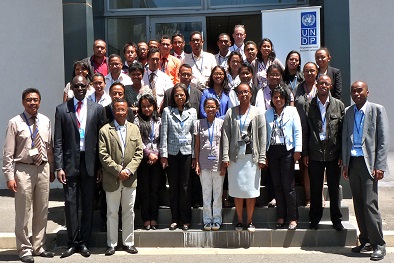The GWP – WACDEP Africa Coordination Unit joined colleagues of UNDP in the mission from the 13th to 19th March 2015 and were involved in various meetings with country stakeholders and partners including the Directorate General of Meteorology (DGM), the General Secretary of the Ministry of Water Sanitation and Hygiene, the General Secretary of Environment, the Unit for the Prevention and the Management of Urgencies, Directorate of Global Planning and the Head of Monitoring and Evaluation Unit within the Ministry of Planning and Economy, the National Office for Environment, the General and Technical Directorate of Agriculture , WWF Country Office of African Development Bank-Country Office, UNDP-Country Office, and EU delegation.
On 17th March 2015, during the mission in Antananarivo, the Government of Madagascar launched the new National Adaptation Plan (NAP) initiative to assist policy makers develop strategic national planning to respond, prepare and adapt to the effects of climate change. The event was organized with the support of United Nations Development Programme (UNDP).
The launch of the NAP came at a critical time, as Madagascar has been hit by tropical storms and heavy rains throughout early 2015, which have affected more than 93,000 people. Over 4,800 homes and critical infrastructure have been wiped out. The capital Antananarivo has been the most greatly affected, with 35,000 people forced to leave their homes.
This came while the Government embarked the country in the planning and the implementation of the integrated water resources management process including various on-going and upcoming activities: (i) reviewing of the national water law of 1999 started recently; (ii) elaborating an IWRM master plan for each of three main basins of the country; (iii) implementing the IWRM master plans for 10 pilot catchments within the country by 2018; (iv) mainstreaming IWRM approach in all water related programmes and projects; (v) quantitative and qualitative assessment of water resources potentialities of the country; (vi) identifying and implementation institutional relevant reforms leading to restructure and reorganize the National Authority of Water and Sanitation, the National Fund of Water and Sanitation, Agencies of basins and Committee of basins/ catchments.
"Adaptation to climate change is a matter of survival. We feel that the devastating recent floods are due to environmental hazards, and the adverse effects of climate change. Madagascar has not witnessed floods on this scale since 1958. Therefore, the Government is initiating a National Adaptation Plan which will help us adapt and prepare,” said Marcellin Rapeantondro, Secretary General of the Ministry of Environment, Ecology, Sea and Forestry.
The National Adaptation Plan (NAP) launch ceremony and a subsequent workshop were attended by 80 senior policy makers and government officials, to advance the NAP process. Participants are representatives of key sectoral ministries, technical and financial partners and civil society. An important objective of the workshop was to engage political decision makers and policy makers at the very start of the NAP process in Madagascar.
This mission supported Madagascar to plan strategically to prepare for the long-term effects of climate change. It represented key opportunities to: (i) identify plan and develop sectoral processes to advance climate change adaptation planning and budgeting in the medium and long term; and (ii) facilitate stakeholder dialogue to determine the appropriate institutional arrangements for the implementation of the NAP process.
"The NAP will support Madagascar to integrate disaster risk reduction and management, with climate change adaptation processes - which will help the country better manage climate scenarios and disasters of tomorrow," said Jonas Mfouatie, UNDP Deputy Resident Representative during the launch ceremony held on 17th March 2017.
The NAP-GSP is assisting Least Developed Countries (LDCs) to advance National Adaptation Plans (NAPs). The Global Support Programme on NAPs has been set up to assist countries to bring greater focus and attention to medium and long-term climate change adaptation planning as well as budgeting. The Global Water Partnership is among the partner agencies to the NAP-GSP. Others include UNDP, UNEP, WHO, FAO, IFAD, UNITAR, GEF, UNFCCC, GIZ , PROVIA, and UNISDR. The NAP-GSP was launched on 14 June 2013 with financing from the Least Developed Country Fund (LDCF).
